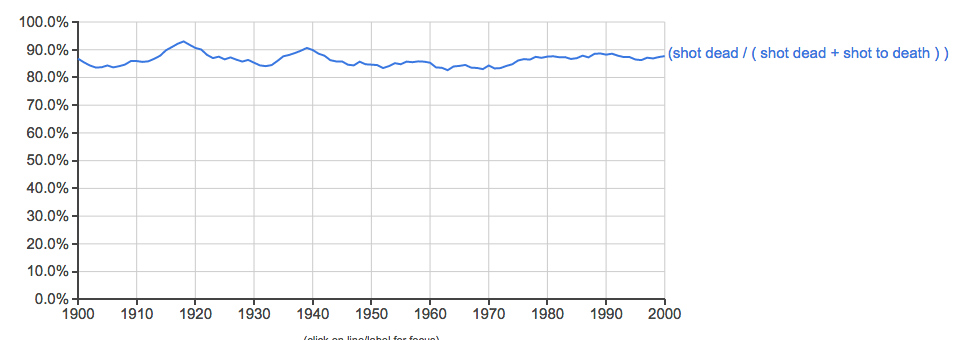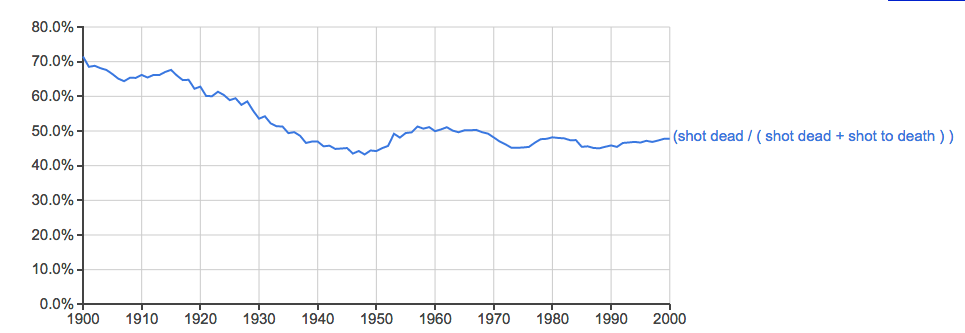Shooting dead as NP?
« previous post | next post »
Mark Mandel was surprised to see "shooting dead" apparently used as a noun phrase in a Guardian headline: "Two officers arrested over shooting dead of six-year-old Louisiana boy",11/7/2015. The obligatory screenshot:
My first thought was that this is a typo for "shooting death", not an example of syntactic variation — because it's the Grauniad and all. But a quick web search suggests that "shooting dead of X" is really a thing:
"Shooting dead of homeless camper sparks outrage against Albuquerque police – the department that kills more people than the NYPD", The Independent 4/1/2014
"Teens to be charged as adults in shooting dead of 10-year-old boy", Local10 News 8/10/2015.
"Woman held over shooting dead of man outside Co Kildare home", Press Association 8/26/2015
"Police shooting dead of pellet gun boy Tamir Rice (12) justified – experts", The (Irish) Independent 10/11/2015.
"Speaking this evening Garda Commissioner Noirín O'Sullivan has expressed her shock following the shooting dead of the Garda in Co Louth." (link)
Lord Justice Sales allowed their application for permission to appeal, but warned the family against thinking his decision meant they would succeed. But he added that "the shooting dead of a suspect by police is always a matter for careful scrutiny". (link)
The family of Tamir Rice have accused officials of a “whitewash” after two outside experts said the shooting dead of the black 12-year-old by a police officer was “reasonable”. (link)
Most but not all of these are from the UK or Ireland, suggesting a possible trans-Atlantic difference.
Update — However, as Guy points out in the comments, "shooting dead of X" may be a form of "shooting of X dead", itself a nominalization of "shooting X dead", with postposing of a relatively heavy prepositional-phrase object. Some other examples of this phenomenon:
There is no doubt the tragedy of this case is the driving to distraction of a gentle genius by a rather insecure and truculent district attorney. (link)
Please stop the shipping to China of 36 baby elephants. (link)
Animal sacrifice was an early holding open of oneself to the Lord. (link)
Update 2 — In support of the view that there's a trans-Atlantic difference in the frequency of the basic construction, British books use "shot dead" rather than "shot to death" more frequently than American books do:
Or for a numerically larger difference, you could compare this (about a 6-to-1 ratio for "shot dead" versus "shot to death" in recent British books) to this (about a 1-to-1 ratio in recent American books).



Linda said,
November 7, 2015 @ 2:02 pm
And if the victim survives then the phrase is "shooting and wounding".
Guy said,
November 7, 2015 @ 2:04 pm
I read it as a form of the "shot X dead" construction in which the object has been postponed for heaviness.
David L said,
November 7, 2015 @ 2:09 pm
US media often refer to the 'fatal shooting' of a person, or will say that someone was 'fatally shot.' This seems to me like a cleaner phrasing, but then US media have greater familiarity with incidents of this sort.
Michael Rank said,
November 7, 2015 @ 3:54 pm
I think it's worth pointing out that e.g. "He was shot dead" is normal British English, whereas Americans say "shot to death".
Jerry Friedman said,
November 7, 2015 @ 4:01 pm
However, as Guy points out in the comments, "shooting dead of X" may be a form of "shooting of X dead", itself a nominalization of "shooting X dead", with postposing of a relatively heavy prepositional-phrase object. Some other examples of this phenomenon:
There is no doubt the tragedy of this case is the driving to distraction of a gentle genius by a rather insecure and truculent district attorney. (link)
Please stop the shipping to China of 36 baby elephants. (link)
Animal sacrifice was an early holding open of oneself to the Lord. (link)
I'd like all of those better with the "of" phrases not postposed. Taste aside, though, Google finds nothing for "shooting of [a] man/woman/child/boy/girl dead".
mollymooly said,
November 7, 2015 @ 4:42 pm
COCA has a few matches for "[a*] [vvg] [j*] of"
THE LAYING BARE OF 4
THE BREAKING FREE OF 1
NO GETTING TIRED OF 1
NO GETTING FREE OF 1
HIS MAKING VISIBLE OF 1
YOUR GETTING TIRED OF 1
THEIR LOOKING INDICATIVE OF 1
THE TEARING OPEN OF 1
THE SLASHING OPEN OF 1
THE MAKING VISIBLE OF 1
THE MAKING SUBLIME OF 1
THE MAKING SEDENTARY OF 1
THE MAKING PERMANENT OF 1
THE MAKING EXPLICIT OF 1
THE MAKING CONTIGUOUS OF 1
[(myl) Some of these are relevant but some aren't, as we can see by looking at who did what to whom.
When I talk about "the making permanent of the arrangement", it's the arrangement that's being made permanent; but when I talk about "his getting tired of Kim's stories", it's the referent of his that's getting tired, not Kim's stories…]
Jerry Friedman said,
November 8, 2015 @ 12:02 am
Michael Rank: "Shot to death" isn't that much more common than "shot dead" in this ngram search of American books.
John Swindle said,
November 8, 2015 @ 2:18 am
Also "the knocking senseless," "the laying flat," and "the boiling dry." Especially the last, since dry/to dry is more like dead/to die. The problem for me is that the dead are too much with us, and now they're shooting.
Doreen said,
November 8, 2015 @ 2:56 am
@Michael Rank and Jerry Friedman: You could try combining the counts for "shot to death" and "shot and killed" in AmE and comparing their combined frequency with the expression "shot dead". FWIW, I agree with Michael's perception that "shot dead" is the usual expression in BrE.
Graeme said,
November 8, 2015 @ 3:26 am
It feels ungainly but it may serve a purpose. It makes clearer the subject of the sentence did the killing. 'Shooting death' could encmpass a much wider set of causes / incidents.
John Walden said,
November 8, 2015 @ 6:25 am
"Shot to death" sounds (to me) as if there may have been a lot of bullets. "Shot dead" sounds (more) like fewer bullets.
Paul Rhodes said,
November 8, 2015 @ 3:05 pm
It doesn't necessarily mean that the officers did the killing. It means they have been arrested over the killing. Whereas a "shooting death" could be any death suffered as a result of shooting (or during a shooting), such as accidental death of a hunter.
mollymooly said,
November 8, 2015 @ 6:09 pm
For me "shot to death" sounds Just Plain Wrong, but "stabbed dead" would be Even Wronger, so maybe there's no point trying to find any logic in either.
Bathrobe said,
November 8, 2015 @ 6:16 pm
The post refers to a 6-1 ratio in British English. Even that is amazing from my (Australian) linguistic intuition. "Shoot dead" is the ONLY way of saying this, and when I first encountered "shoot to death" it just sounded weird. The two terms have different meanings.
"Shoot dead" implies a pretty sudden death. Bang-bang you're dead. "Stabbed to death" or "beaten to death" implies a more gruesome, drawn-out process of stabs and blows gradually leading to death. (Although admittedly even a single stab to the heart resulting in instant death would be described as "stab to death".)
As John Walden says, "Shot to death" sounds (to me) as if there may have been a lot of bullets. "Shot dead" sounds (more) like fewer bullets. This is precisely my intuition. "Shoot to death", if anything, implies that it took lots of nasty, clumsy shots to finally get the victim to die.
Chas Belov said,
November 8, 2015 @ 10:30 pm
I initially parsed the post title as [shot] [dead as NP].
Anon said,
November 9, 2015 @ 10:29 am
To me this sounds like a southern gothic tale, where sadistic police burst in on a wake (in which a six-year old boy is mourning recently deceased family members) and decide to shoot up all the cadavers.
Rachael said,
November 9, 2015 @ 1:02 pm
The wording doesn't sound too bad to me (British English speaker).
It might have been a rewording of "shooting dead six-year-old boy", which is more idiomatic but could be taken to mean he was already dead. (I think I remember seeing "shooting dead X" discussed on Language Log before.)
Gregory Kusnick said,
November 9, 2015 @ 1:05 pm
"Fatal shootings" and "shooting deaths" I understand, but what's the plural of "shooting dead"? How would one talk about a multiplicity of such incidents?
mollymooly said,
November 9, 2015 @ 7:21 pm
@Gregory Kusnick:
Here are two examples, each of which refers to multiple (related) incidents:
Craig Murray (Scotland)
Jude Collins (Northern Ireland)
Whereas "the shootings of two people" must be two incidents, "the shooting of two people" may be one or two incidents. With "shooting dead", the unambiguously plural option is unavailable, but that does not prevent one talking about a multiplicity of incidents.
Jeff B. said,
November 9, 2015 @ 11:11 pm
The Guardian has changed the phrase to "shooting death."
I was 90% sure it was a typo when I first read it. Now I am 98% it was a typo.